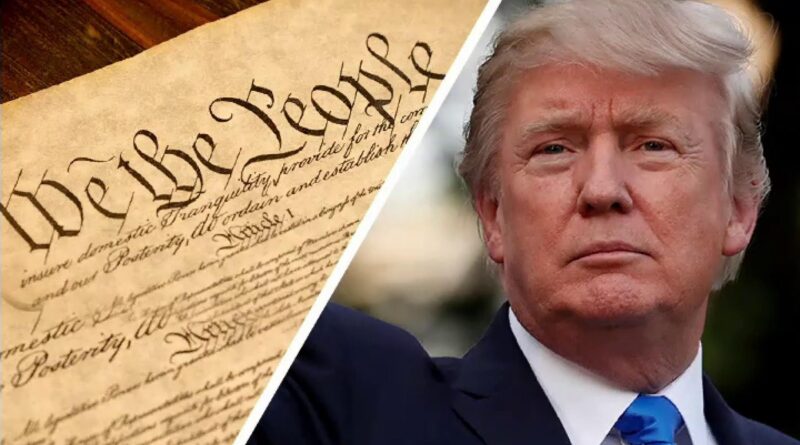The Constitutional Case for Impeaching Donald Trump
One week after the insurrection at the U.S. Capitol, the House of Representatives voted with bipartisan support 232-197 in favor of H.Res 24, impeaching President Donald John Trump for high crimes and misdemeanors. The House charged Trump with “incitement of insurrection” on January 6th and included language declaring Trump unfit to run for public office in the future. This marked the first time in American history a president has been impeached twice by the House.
On January 25th, the House delivered the article of impeachment against former President Donald Trump to the Senate. The impeachment trial will begin in the Senate on February 9th and is expected to move quickly. In order to convict Trump, the Senate will need 67 votes, meaning if all 50 Democrats support a guilty verdict, 17 Republicans will need to break rank with their party and vote with the Democrats.
While the Democrats have the majority in the Senate, a conviction at the impeachment trial will still be a heavy lift. Several Republicans in the Senate have fought back on the impeachment trial, calling it “stupid,” and “a moot point.” Others are saying it is out of scope of the Constitution. Senator Tom Cotton released a statement saying, “the Senate lacks constitutional authority to conduct impeachment proceedings against a former president.”
The impeachment clause of the Constitution, Article II Section 4, states the president and other civil officers “shall be removed from Office” following impeachment and conviction by the Senate. Since Trump is no longer in office, he cannot be removed from office. J. Michael Luttig, a conservative former federal appeals judge, argued that once Trump left office, Congress lost its congressional authority to continue impeachment proceedings.
However, in a bipartisan letter signed by over 150 Constitutional legal scholars on January 21st, they explain:
“In drafting the Constitution’s impeachment provisions, the Framers drew upon the models of impeachment in Great Britain and state constitutions. In 1787, English impeachment was understood to allow for the impeachment, trial, and conviction of former officials; likewise, the law of several states made clear that waiting to impeach officials until they were out of office was preferred or even required, and no state barred the impeachment of former officials.
Our carefully considered views of the law lead all of us to agree that the Constitution permits the impeachment, conviction, and disqualification of former officers, including presidents.”
While Republicans argue the Constitutionality of impeaching after leaving office, it is important to review the first impeachment trial of 1797 when President John Adams sent evidence to Congress indicating that North Carolina Senator William Blount had plotted to help the British seize parts of the United States. By 1798, while Blount was already out of office, the House and the Senate “investigated and debated whether the new Constitution allowed senators to be impeached, or only expelled.” Congress wound up doing both, and Blount became the first senator to be expelled and impeached. For legal and constitutional scholars alike, many refer to the First Congress on constitutional questions because most of its members helped draft and/or ratify the Constitution.
The Constitution outlines two aspects with the power of impeachment under Article I, Section 3 of the Constitution, “judgment in cases of impeachment shall not extend further than to removal from office, and disqualification to hold and enjoy any office of honor, trust or profit under the United States.” While Trump cannot be removed from office because he is no longer in office, he can be disqualified from ever holding office again.
Unlike Blount, Trump was the president at the time of his crime and the constitutional precedent of impeachment after leaving office remains. However, should Republicans want to adhere to the constitutional defense that a president cannot be impeached once they have left office, that would open the door to allow future presidents to commit untold crimes, and at worst, resign before conviction without consequence. Essentially, putting the president above the law.
However, during the impeachment of Senator Blount, one of the lead House prosecutors, Representative James Bayard, and Blount’s lawyer agreed that a civil officer could not escape impeachment through resignation, but Blount was not convicted in the Senate. Nevertheless, in 1864, former president John Adams’s son, John Quincy Adams echoed this sentiment on the House floor, “I hold myself, so long as I have the breath of life in my body, amenable to impeachment by this House for everything I did during the time I held any public office.”
It is a historic first for a president to be impeached twice in the House; the Senate prepares to embark on another historic first, convicting a president that has already left office. However, it remains to be seen if Republican Senators will be apt to adhere to constitutional precedents and break away from Trump’s grasp in order to uphold the Constitution they swore to protect when they took office. Every vote in the Senate is important, the vote to convict Trump and hold him accountable for the insurrection at the United States Capitol on January 6th will be one for the history books and leave a mark on our nation long after the 117th Congress has adjourned.
Written for and originally published on Stand Up Republic

